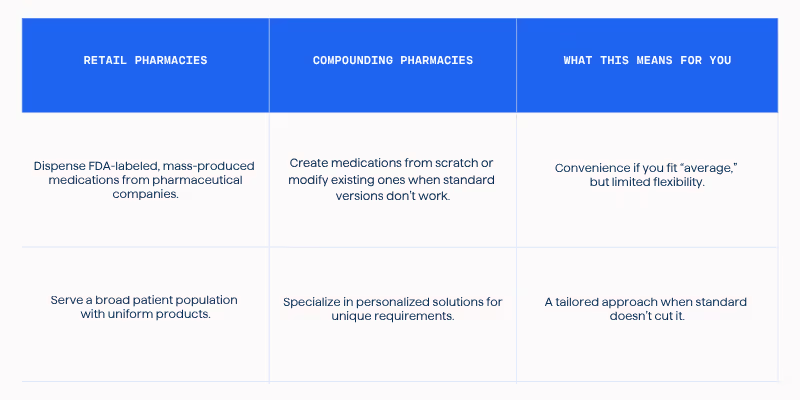A Complete Guide to Personal Medication
Healthcare is rarely one-size-fits-all, yet most medications on the market are mostly formulated for the “average” patient—average weight, average metabolism, average needs. But what if you’re not average?
Think of medicine like clothing: off-the-rack works for some, but others need a custom fit. That’s where compounding pharmacies come in.
A compounding pharmacy creates custom medications designed to meet an individual’s needs when standard medications fall short. As healthcare continues shifting toward personalization, compounding is re-emerging as one of the most vital tools for both patients and providers.
In this guide, we’ll explore what compounding pharmacies do, how they differ from retail pharmacies, why they matter for both providers and patients, and where this field is headed next.
The Basics of Compounding Pharmacies
What are compounding pharmacies? What do they do exactly?
At its core: rather than dispensing a pre-manufactured pill, compounding pharmacists use raw pharmaceutical ingredients to prepare the exact strength, dosage form, and formula each patient’s needs.
How is a compounding pharmacy different from a retail pharmacy?
A retail pharmacy dispenses mass-produced, standardized drugs from pharmaceutical manufacturers. A compounding pharmacy fills the gap with custom medications designed to fit the patient, not the average.

Bottom line: Retail pharmacies fill prescriptions that already exist. Compounding pharmacies design what’s needed.
A Brief History of Compounding
Pharmacy compounding isn’t new—it’s how pharmacy began.
Early Apothecaries: For centuries, apothecaries prepared every medicine by hand, tailoring remedies to the person standing in front of them. They were artisans of medicine, blending natural ingredients into personalized formulations.
The Industrial Revolution: Mass drug manufacturing in the 20th century made standardized medications widely available. This expanded access dramatically, but personalization declined. Patients were treated as averages, not individuals.
The Modern Resurgence: Today, compounding is resurging. Patients and providers are seeking care that moves beyond averages to something more integrative, tailored, and human. In a system built on mass production, compounding reminds us that every person deserves care made for them.
How Compounding Works
Compounding blends science, precision, and care. Here’s how the process unfolds:
- Prescription: A provider determines that a patient needs a custom medication and specifies the strength, dosage form, ingredients, and amount/quantity.
- Ingredients: The pharmacist sources pharmaceutical-grade materials.
- Preparation: Using specialized equipment, the pharmacist compounds the medication with exact measurements.
- Quality & Standards: At rigorous compounding pharmacies like Strive, each preparation follows strict guidelines and standards to ensure the highest quality, including consistency, potency, and stability.
Types of Compounding
- Sterile Compounding: Injections, eye drops, or IV medications prepared using aseptic technique.
- Non-Sterile Compounding: Capsules, creams, gels, suppositories, and flavored liquids.
- Pediatric Compounding: Turning bitter medications into flavored suspensions or creating smaller doses or lower concentrations for children.
- Veterinary Compounding: Tailoring medications for animals in forms they’ll accept, such as flavored chews or transdermal gels.
- Bioidentical Hormone Compounding: Personalized hormone formulations for men and women.

Why Patients & Providers Turn to Compounding
Why not just stick with retail pharmacies? Because in a world of diverse needs, sensitivities, and comfort levels, one-size-fits-all medicine doesn’t always work.
- Customization: Adjusting medication strength, dosage, or formula for unique needs.
- Unavailable or Shortage Medications: Compounding pharmacists can prepare important medications that are temporarily unavailable, discontinued, or affected by national drug shortages. This ensures patients continue receiving essential medications even when commercial options are out of stock.
- Allergies & Sensitivities: Dye-free, gluten-free, and preservative-free options for sensitive patients.
- Alternative Dosage Forms: Commercial forms aren’t always ideal based on the patient’s needs. Compounded medications can be created as liquids, creams, gels, troches, flex-dose tablets, or injections.
- Precision Dosing: Essential for pediatrics, geriatrics, and patients with unique metabolic profiles.
Together, these factors are driving more patients and providers toward compounding when standardized options fall short. So, how does that play out in real-world care?
Compounding in Action: Real-World Case Studies
Compounding’s value emerges in everyday scenarios and diverse patient use cases where standard care leaves a gap. These examples illustrate how custom formulations can help providers solve real challenges and support personalized patient care:
- Pediatrics: A toddler refuses a bitter liquid antibiotic. A compounding pharmacist reformulates it into a grape-flavored suspension, making adherence much easier.
- Hormone Support: A woman experiencing menopausal changes isn’t finding relief with standard hormone doses. Her provider partners with a compounding pharmacy to create a cream at the exact strength that aligns with her individual needs.
- Dermatology: A dermatologist caring for a patient with eczema needs a topical solution that combines two ingredients not commercially available together in one product. The compounder prepares a custom blend that matches the required combination, ratio, and texture.
- Veterinary: A cat requires thyroid medication but refuses pills. The pharmacist prepares a transdermal gel applied to the cat’s ear, eliminating the daily struggle of administering oral medication.
- Pain Management: Some patients benefit from topical pain formulations that combine multiple active ingredients for targeted relief, reducing the need for oral medications.
Each example highlights compounding’s central purpose: creating medication that fits real lives and individual needs.

Regulations and Quality Standards for Compounding Pharmacies
Compounding pharmacies in the U.S. operate under strict professional, regulatory, and safety standards. Oversight and compliance requirements include:
- FDA (Food and Drug Administration): Provides guidance and oversight related to drug quality and integrity. While 503A compounding pharmacies like Strive are not directly regulated by the FDA, they are expected to comply with applicable FDA guidance and may be inspected by the FDA if concerns or issues arise.
- USP (United States Pharmacopeia): Establishes enforceable standards for compounding, including:
- USP <795>: Non-sterile compounding
- USP <797>: Sterile compounding
- USP <800>: Handling of hazardous drugs
- USP <795>: Non-sterile compounding
- State Boards of Pharmacy: Sets and enforces the laws, rules, and regulations governing pharmacy practice in each state. These boards oversee compliance across all aspects of compounding operations in their respective state.
- DEA (Drug Enforcement Administration): Regulates controlled substances and ensures compliance with federal laws related to prescribing, handling, dispensing, and recordkeeping.
- State Business Licensing Agencies: Issues and renews business licenses required to operate legally within the state.
- Accreditation Bodies (e.g., PCAB, NABP): Provides third-party validation through rigorous review processes to confirm adherence to quality, patient safety, and operational standards designed to protect patients and ensure compliant compounding practices.
- LegitScript Certification: Confirms that the pharmacy meets established standards for transparency, compliance, and patient safety in online operations.
- State Departments of Health: May conduct inspections or issue additional requirements to ensure public health compliance at the state level.
- OSHA (Occupational Safety and Health Administration): Oversees workplace safety standards to protect pharmacy personnel and maintain a safe compounding environment.
- Environmental Protection Agency (EPA): Ensures proper waste handling and disposal practices in accordance with federal and, where applicable, state environmental health regulations.
Compounding pharmacies must meet a wide range of federal and state requirements that collectively safeguard quality, accountability, and patient well-being. These layers of oversight ensure every compounded formulation is prepared under the highest professional standards.
The Future of Compounding Pharmacies
Compounding isn’t just a return to pharmacy’s roots—it’s a key player in the future of medicine.
- Personalized Medicine Movement: Advances in genomics and functional medicine are accelerating the demand for individualized care.
- Digital Health & Telemedicine: Virtual consults and e-prescribing practices expand nationwide access to customized medications.
- Innovation in Delivery Systems: Interest in novel dosage forms, new or revamped absorption technologies, and precise compounding tools continues to expand.
- Provider Demand: As integrative and preventative care grows, providers are turning to compounding especially for complex, nuanced patient cases.
We’re just beginning to see what’s possible in custom medicine. Imagine medications shaped by doses and delivery methods that individually fit a patient’s unique needs. The future of medicine is personal, and compounding is already leading the way.
Strive for More: Personalization in Action
At Strive Pharmacy, we have never believed in one-size-fits-all medicine. Since 2018, our pharmacists have focused on one simple goal: making medicine personal. Strive began when we noticed a real gap: providers were limited by standardized care, and patients were looking for something that actually worked for their unique needs. We set out to close that gap with medications built on science and guided by empathy.
Each compounded medication starts with precision but always keeps people at the center. We hold ourselves to the highest quality standards because providers trust us with what matters most: their patients. From sourcing ingredients to testing every batch, we put care into every detail.
Strive isn’t just about the medicine. It is about helping people create wellness for the long run, shifting healthcare from reactive to proactive, and building a thriving life in the process.
Compounding Pharmacies: Medicine Designed for Personalized Care
Compounding pharmacies bring healthcare back to its essence: individualized, thoughtful, and deeply human. For patients, compounding means access to medications that fit your life, whether that’s dye-free capsules, flavored liquids, or custom hormone formulations. For providers, it expands the toolkit with tailored options that support adherence and care outcomes.
In a healthcare system built on averages, compounding reminds us that you are not average—and your care shouldn’t be either. If you’re curious whether a compounding pharmacy could benefit you or your patients, talk with your healthcare provider or pharmacist. The future of medicine isn’t mass-produced, it’s personal.
For Patients
Find a Provider Near You
Discover doctors, clinics, and medical providers in your area who work with Strive Compounding Pharmacy.
Search by name, address, or explore the interactive map to see who’s nearby.
→ Find a Provider
For Healthcare Providers
Partner with Strive Pharmacy
Prescribe with precision. Personalize every plan.
At Strive, we deliver custom compounds designed to move the needle on patient health, provider empowerment, and long-term impact.
→ Become a Provider

Frequently Asked Questions About Compounding Pharmacies
Q: Are compounded medications FDA-approved?
A: Compounded medications are specially crafted and made for a specific patient based on a provider’s prescription, so they don’t go through the FDA’s approval process for mass-produced drugs. Instead, compounding pharmacies are regulated by State Boards of Pharmacy and operate under FDA oversight, ensuring every dose is handled with the highest level of care and consistency for patient safety. Compounding pharmacies must adhere to strict quality standards set by the United States Pharmacopeia (USP), including chapters USP <795> for non-sterile preparation, USP <797> for sterile preparations, and USP <800> for hazardous substances.
Q: Will my insurance cover compounded medications?
A: Coverage for compounded medications can vary. Most insurance plans are structured around commercial, FDA-approved medications, which means compounded medications may not be covered automatically. Many patients using compounding pharmacies pay out-of-pocket and then submit a claim for reimbursement, but it’s always best to check with your insurance provider for your specific plan benefits. At Strive, we do not accept insurance so patients need to pay out of pocket – but we are always happy to provide the necessary paperwork for patients to submit a claim for insurance reimbursement.
Q: How much does a compounded medication cost?
A: Cost depends on the ingredients, the complexity of the formula, and how long it takes to prepare. Because each prescription is made by hand and customized to the individual, it may cost more than a standard generic pill — but the price reflects the precision, individualized attention, care that go into it.
Q: Why would a healthcare provider prescribe a compounded medication?
A: Providers turn to compounding when a patient’s needs can’t be met by standard options. Common reasons include:
- Allergies or Sensitivities: Removing ingredients like dyes, gluten, or preservatives.
- Precise Dosing: Creating a dose, concentration, or combination of ingredients not available commercially.
- Alternative Forms: Preparing a liquid, cream, gel, or suppository instead of an oral pill.
- Drug Shortages: Filling the gap by preparing medications that are temporarily unavailable due to a drug shortage.
Q: Do I need a prescription for compounded medication?
A: Yes. Every compounded medication requires a valid prescription from a licensed healthcare provider—such as a physician, nurse practitioner, or veterinarian—specifying the ingredients, strength, amount, dosage form, and directions needed for that individual.
This information is for educational and informational purposes only and is not a treatment recommendation. The information provided relates to patient-specific compounding. Compounded medications are specially prepared for individual patient needs and, as such, have not been reviewed or approved by the U.S. Food and Drug Administration (FDA). The above statements have not been evaluated by the FDA. Prescribers should use their independent clinical judgment when determining appropriateness for individual patients.























